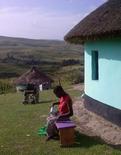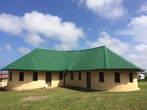Community Projects
Rural Ability

The Rural Ability Programme (RAP) is Jabulani Foundation's first Community Based inclusive development (CBID) programme. The realisation of a dream of having a local CBID programme, with a broader scope than just health or rehabilitation, has been made possible through the partnership between Jabulani and the Christian Blind Mission (www.cbmsa.org).
Transport to the clinic for a patient in a wheelchair: R600 per trip. Access to special needs education: nearest school, 90km away. Employment opportunities and skills development programmes: almost non-existent. Disabled people in urban areas face challenges that able-bodied people don’t ever have to consider. These challenges are exacerbated by our deeply rural setting, to the point where we know of disabled adults in our community who have never left their homes. The Rural Ability Programme is working to improve the quality of life for people with disabilities through promoting and facilitating the inclusion of people with disabilities in mainstream society.
Through our interactions and learning from the community the RAP seeks to establish a best practice CBID model which can be replicated in other rural communities in South Africa.
The Rural Ability Programme aims to:
Transport to the clinic for a patient in a wheelchair: R600 per trip. Access to special needs education: nearest school, 90km away. Employment opportunities and skills development programmes: almost non-existent. Disabled people in urban areas face challenges that able-bodied people don’t ever have to consider. These challenges are exacerbated by our deeply rural setting, to the point where we know of disabled adults in our community who have never left their homes. The Rural Ability Programme is working to improve the quality of life for people with disabilities through promoting and facilitating the inclusion of people with disabilities in mainstream society.
Through our interactions and learning from the community the RAP seeks to establish a best practice CBID model which can be replicated in other rural communities in South Africa.
The Rural Ability Programme aims to:
- Improve the interaction with health services and continuity of rehabilitation services for people with disabilities. Community Disability Workers will work with people with disabilities and their families in their homes to address everyday functioning and to prevent secondary problems.
- Increase access to educational opportunities for children with disabilities in their homes and in schools through early childhood interventions.
- Facilitate opportunities for families and individuals with disabilities to create a quality livelihood to support themselves and contribute to their family and community. This includes skills training and supporting income generating activities.
- Increase the capacity of people with disabilities in this area to resolve difficulties and interact constructively with service providers and the local community.
Masiphakameni Youth Development Programme
After five years of successfully running the Jump Start youth development gap year programme, we have handed it over to a new NGO that’s operating in Zithulele, Sihamba Sonke. In its place, we are piloting a similar programme for young women as a need for this still exists. The Masiphakameni (Let's Rise) programme will run along similar lines as the Jump Start programme in order for us to maximise our learning over the years, but be tailored to be appropriate and relevant to young women.
Masiphakameni addresses an important and often overlooked demographic: young adults who have already left secondary school and may not desire or be ready for further education and have not been able to find work, and are facing, at best, an uncertain future. In the rural Eastern Cape, an area with so few opportunities and so little hope, it is especially important to address this group and create new avenues for success and a fresh perspective on the future.
Ranging from “classroom” type learning to practical sessions and outdoor sports, the aim of the programme is to expose the participants to a wide variety of skills and experiences, as well as to develop their confidence and a deeper sense of identity, while providing a safe space and mentorship to guide them through this processes. The programme has five main focus areas: Personal Development, Lifeskills, Employability Skills (including gaining an accredited IT qualification), Physical Health, and General Knowledge, and also includes a 9 month work placement with local organisations.
Masiphakameni addresses an important and often overlooked demographic: young adults who have already left secondary school and may not desire or be ready for further education and have not been able to find work, and are facing, at best, an uncertain future. In the rural Eastern Cape, an area with so few opportunities and so little hope, it is especially important to address this group and create new avenues for success and a fresh perspective on the future.
Ranging from “classroom” type learning to practical sessions and outdoor sports, the aim of the programme is to expose the participants to a wide variety of skills and experiences, as well as to develop their confidence and a deeper sense of identity, while providing a safe space and mentorship to guide them through this processes. The programme has five main focus areas: Personal Development, Lifeskills, Employability Skills (including gaining an accredited IT qualification), Physical Health, and General Knowledge, and also includes a 9 month work placement with local organisations.
Multi-function Community Centre

Jabulani has been granted a prime piece of land in Zithulele village by the community and chiefs, to be developed for the benefit of the community.
Phase One of the development was completed in 2011, where three dilapidated buildings previously on the land were renovated into a library, community hall and Jabulani Foundation offices. Outside the buildings a community play park has been built with a jungle gym complete with climbing wall! We envisage that the site as a whole will become a place for all sections of the community to meet, learn and communicate, and look forward to having a range of events take place at the facilities in the coming months.
Phase Two is planned to constitute the building of a maths and science lab, classroom, carpentry workshop, storeroom, and space for small businesses.
Phase One of the development was completed in 2011, where three dilapidated buildings previously on the land were renovated into a library, community hall and Jabulani Foundation offices. Outside the buildings a community play park has been built with a jungle gym complete with climbing wall! We envisage that the site as a whole will become a place for all sections of the community to meet, learn and communicate, and look forward to having a range of events take place at the facilities in the coming months.
Phase Two is planned to constitute the building of a maths and science lab, classroom, carpentry workshop, storeroom, and space for small businesses.
Micro-finance Projects

The lack of employment opportunities, with around 90% of people out of work and relying on government grants to support them and their families, is a huge problem in our area. Most community members live hand-to-mouth, and have no surplus funds to break them out of the poverty cycle.
Through our micro-finance project, we are keen to bring economic empowerment to the community; providing small, interest-free loans to those applicants with a workable business plan. The loans are to assist with essential start-up costs for business, for example buying initial supplies. We also provide essential business skills training and ongoing support.
We have provided loans to 13 women to start a sewing business, and to entrepreneur James Jabula who makes a variety of leather products – from cell phone covers and wallets to shoes to harnesses and horse blinkers!
Through our micro-finance project, we are keen to bring economic empowerment to the community; providing small, interest-free loans to those applicants with a workable business plan. The loans are to assist with essential start-up costs for business, for example buying initial supplies. We also provide essential business skills training and ongoing support.
We have provided loans to 13 women to start a sewing business, and to entrepreneur James Jabula who makes a variety of leather products – from cell phone covers and wallets to shoes to harnesses and horse blinkers!









